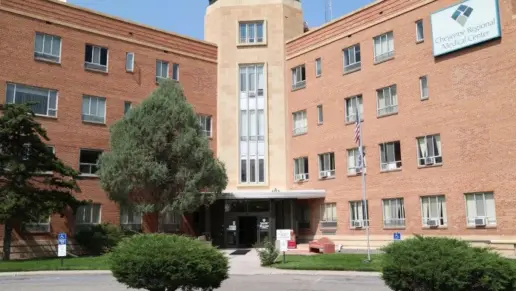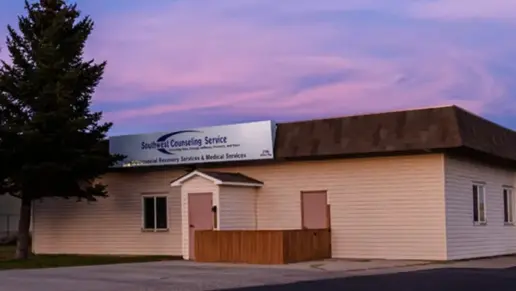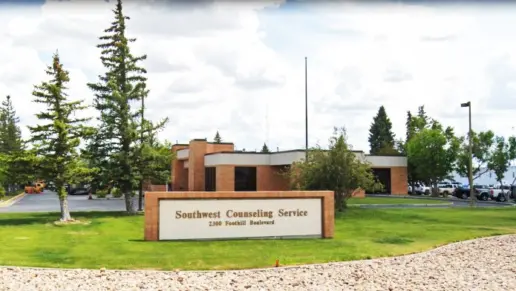About Southwest Counseling Services
Specialty rehab programs at Southwest Counseling Services include tailored care focusing on women's specific needs and experiences, gender-specific addiction treatment addressing unique challenges faced by men, and specialized drug rehab for veterans, addressing combat-related trauma and reintegration.
Patients at Southwest Counseling Services will find the residential setting creates an immersive environment promoting full engagement in recovery away from daily triggers and the private rooms that give personal space for reflection and undisturbed rest during treatment.
Southwest Counseling Services has received accreditations from CARF and the state of Wyoming.
Facility Overview
Accepted Insurance
Other Forms of Payment
Private insurance refers to any kind of healthcare coverage that isn't from the state or federal government. This includes individual and family plans offered by an employer or purchased from the Insurance Marketplace. Every plan will have different requirements and out of pocket costs so be sure to get the full details before you start treatment.
Self-pay involves paying for treatment out of your own pocket. You can use savings or credit, get a personal loan, or receive help from family and friends to fund your treatment. If you don't have insurance or your insurance plan doesn't cover a specific program, self-pay can help ensure you still get the care you need.
Financial aid can take many forms. Centers may have grants or scholarships available to clients who meet eligibility requirements. Programs that receive SAMHSA grants may have financial aid available for those who need treatment as well. Grants and scholarships can help you pai for treatment without having to repay.
Sliding scale payments are based on a client's income and family size. The goal is to make treatment affordable to everyone. By taking these factors into account, addiction recovery care providers help ensure that your treatment does not become a financial burden to you or your family, eliminating one barrier to care.
Medicare is a federal program that provides health insurance for those 65 and older. It also serves people under 65 with chronic and disabling health challenges. To use Medicare for addiction treatment you need to find a program that accepts Medicare and is in network with your plan. Out of pocket costs and preauthorization requirements vary, so always check with your provider.
Medicaid is a state based program that helps lower-income individuals and families pay for healthcare. Medicaid covers addiction treatment so those enrolled can use their coverage to pay for rehab. When a program accepts Medicaid the client often pays very little or nothing out of their own pocket.
Military members, veterans, and eligible dependents have access to specific insurance programs that help them get the care they need. TRICARE and VA insurance can help you access low cost or no cost addiction and mental health treatment. Programs that accept military insurance often have targeted treatment focused on the unique challenges military members, veterans, and their families face.
Addiction Treatments
Levels of Care
Treatments
The goal of treatment for alcoholism is abstinence. Those with poor social support, poor motivation, or psychiatric disorders tend to relapse within a few years of treatment. For these people, success is measured by longer periods of abstinence, reduced use of alcohol, better health, and improved social functioning. Recovery and Maintenance are usually based on 12 step programs and AA meetings.
The programs offered at drug rehab in Wyoming address the underlying issues of addiction, with the goal being to get to the root of the problem. By learning to manage issues without substance use, you are empowered to live a healthy, drug-free life.
Many of those suffering from addiction also suffer from mental or emotional illnesses like schizophrenia, bipolar disorder, depression, or anxiety disorders. Rehab and other substance abuse facilities treating those with a dual diagnosis or co-occurring disorder administer psychiatric treatment to address the person's mental health issue in addition to drug and alcohol rehabilitation.
Opioid rehabs specialize in supporting those recovering from opioid addiction. They treat those suffering from addiction to illegal opioids like heroin, as well as prescription drugs like oxycodone. These centers typically combine both physical as well as mental and emotional support to help stop addiction. Physical support often includes medical detox and subsequent medical support (including medication), and mental support includes in-depth therapy to address the underlying causes of addiction.
Substance rehabs focus on helping individuals recover from substance abuse, including alcohol and drug addiction (both illegal and prescription drugs). They often include the opportunity to engage in both individual as well as group therapy.
Programs



Clinical Services
Cognitive behavioral therapy (CBT) in Wyoming can occur in various formats. Common types of CBT include dialectical behavior therapy, acceptance and commitment therapy, mindfulness based cognitive therapy, and rational emotive behavior therapy. The main focus of each is to help participants change thought and behavior patterns.
Substance use disorder treatment in Wyoming may include dialectical behavior therapy. This evidence based approach seeks to give clients the tools they need to manage their emotions and make healthy changes in thinking and behavior. Treatment includes individual sessions, group skills sessions, and homework assignments.
Group therapy sessions empower men and women in Wyoming to recognize their inner strength and capabilities as they work to overcome addiction. This helps boost self esteem and self confidence, which are factors in relapse prevention programs. By recognizing the triggers and high risk situations, you can develop coping mechanisms to maintain sobriety.
Men and women in Wyoming seeking personalized help for drug and alcohol addiction treatment usually undergo individual therapy. This involves a collaborative effort between you and the therapist to address your needs and challenges. A customized approach helps your therapist develop effective strategies to overcome addiction and maintain a substance free life.
Motivational interviewing helps you recognize the importance of change and your capacity to make change. It empowers you to change rather than providing warnings or directions to change. This method is often used in the treatment of substance use disorder.
Trauma therapy addresses traumatic incidents from a client's past that are likely affecting their present-day experience. Trauma is often one of the primary triggers and potential causes of addiction, and can stem from child sexual abuse, domestic violence, having a parent with a mental illness, losing one or both parents at a young age, teenage or adult sexual assault, or any number of other factors. The purpose of trauma therapy is to allow a patient to process trauma and move through and past it, with the help of trained and compassionate mental health professionals.
For many couples, attending couples therapy in Wyoming is a powerful way to strengthen their relationship. It can be useful for improving communication, increasing intimacy, navigating addiction, or rebuilding trust. Sessions typically last about 12 weeks.
Addiction takes an emotional toll on all members of the family. Family therapy sessions help members openly talk about these challenges and develop effective coping strategies to create a stable environment that supports their loved one's recovery.
Amenities
-
Residential Setting
-
Private Rooms
Staff & Accreditations
Staff

Chair

Treasurer

Secretary

BOD

BOD

BOD
Accreditations

The Commission on Accreditation of Rehabilitation Facilities (CARF) is a non-profit organization that specifically accredits rehab organizations. Founded in 1966, CARF's, mission is to help service providers like rehab facilities maintain high standards of care.
CARF Accreditation: Yes

State Licenses are permits issued by government agencies that allow rehab organizations to conduct business legally within a certain geographical area. Typically, the kind of program a rehab facility offers, along with its physical location, determines which licenses are required to operate legally.
State License: Wyoming
Contact Information
1414 9th St
Rock Springs, WY 82901














